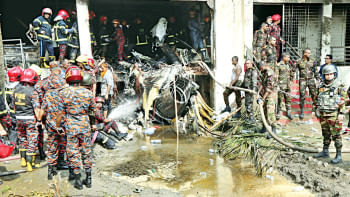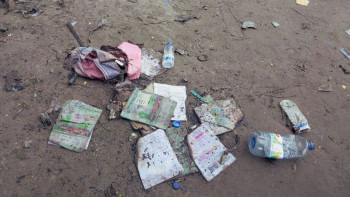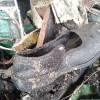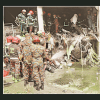A few questions over the Dhaka jet crash

The recent fighter jet crash at a school campus in Dhaka has led many to question the wisdom of running an airbase in Kurmitola and conducting training flights from there. This is an issue seldom broached in public media, let alone being discussed or debated.
The Bangladesh Air Force (BAF) chief explained why the airbase was necessary during an emotional address a day after the crash, standing on the tarmac of the BAF Base Bir Uttam AK Khandker adjacent to Dhaka's main airport. Then two senior officers, both one-star generals, explained the necessity of an airbase in Dhaka during a press conference on July 28.
On July 27, the government formed a nine-member probe commission to examine the cause of the tragic crash, assess damage and casualties, and determine the responsibilities. The commission has been told to submit a report within four weeks.
The remarks and the formation of the probe commission raise questions that have not so far been answered—perhaps because they have not been asked in the first place.
Let us begin with the airbase and flight training. Air Chief Marshal Hasan Mahmood Khan said, "This is our main base... this is our most important space. All the VIPs live here, our structures are here, and the parliament is here. There is a matter of protection. So, it's very important to have a strong air base here."
His remarks boil down to the air force's overriding priority of protecting the skies over Dhaka. Air Commodore Shahidul Islam, director of air operations, echoed his chief on July 28. He also pointed out that Dhaka was not alone in having an airbase in the capital. This was common around the world, he said. The one-star general explained that flight training was part and parcel of an airbase.
A cursory look at neighbouring countries and commonly referred capitals finds that airbases, or even airports, typically lie outside city limits, unlike Kurmitola which is very much within Dhaka city, just over eight kilometres away from parliament.
For instance, the Hindon air force station is about 16 kilometres from the Indian Lok Sabha but outside Delhi city limits. However, Hindon is used for VIP movement and not for fighter aircraft operation. From that respect, the nearest airbase (with fighter aircraft activity) is Ambala, home to the Rafales, about 200 kilometres away in Haryana.
The closest air base to Islamabad is Nur Khan, which is in the neighbouring city of Rawalpindi almost 13 kilometres away from the Pakistan parliament. The Katunayake airbase in Sri Lanka is integrated with the Bandaranaike International Airport, very much outside Colombo city limits, about 30 kilometres from the parliament building.
The air force base at Andrews is in Maryland, the adjacent state to Washington DC, about 15 kilometres away from the US Congress. The Northolt air force station is also outside London city limits, about 20 kilometres away from the House of Commons. Although the Kubinka air base is 60 kilometres away from the Moscow city centre, it is officially within the "greater Moscow" area.
It may be that the operational and strategic necessity for having a base in Dhaka is unique and thus may not be likened with other cities, but it has not yet been clarified. Nor does the air force explain why it is that flight training cannot be conducted from other locations.
To put things in perspective, the F7 can reach a top speed of Mach 2, which is double the speed of sound at about 2,465 kilometres per hour. Presuming that it flies at a modest speed of 1,200 kilometres per hour, it would be barely two minutes' flying time away from a base in Arial Beel, for instance, or seven minutes away from the base in Jashore.
It has rightly been pointed out that the airbase was built at a time when there was no such dense settlement in Uttara. The airport was well outside the city limits. But Dhaka has since grown to completely engulf the airport. It should by all means be examined why the city authorities did not exercise caution when sanctioning plans for residences and schools that fall in the flight path. It should also be kept in mind that even if the airbase were removed, the airport would still be there and there would be hundreds of buildings in the flight path of passenger aircraft.
However, to suggest that having airbases in capitals is almost a standard practice around the world, when it is clearly not, raises doubts in the public mind.
The air chief said, "A strong air force is essential for our sovereignty. Do not weaken this pillar with rumours." Exploring the possibilities of an alternative airbase is not an attempt to weaken it at all. But when responsible air force officers make sweeping statements, it does eat away at the credibility of this integral part of our armed forces and weakens its very foundations.
The decision to run an airbase or conduct training out of Kurmitola, however, rests with the defence forces. It would be encouraging to see relevant experts putting their heads together to re-evaluate their operational and strategic priorities under the current context.
As for the second issue of a probe commission formed by the government, the official notification says that the nine-member body will examine the cause of the crash, assess damage and casualties, and determine the responsibilities.
This commission headed by former Secretary AKM Zafar Ullah Khan also includes a retired air vice marshal, three additional secretaries from three ministries, Dhaka divisional commissioner, an urban planner, and a professor of mechanical engineering from BUET. There have been several accidents involving the F7, but the commission does not include anyone from the manufacturer. One recalls that India included Boeing officials when probing the recent crash in Ahmedabad.
Noting that there are no aviation experts, no aeronautical engineers or anyone with technical knowhow, how is this committee to examine the reason for the crash? Presumably, another investigation by the air force will be delving into that, and the findings may be kept away from the public for security reasons lest they compromise classified information. That is quite understandable. But it should then be clarified by the government. Other than this investigation, there has been no visible initiatives that might lead to some sort of corrective measures, a point of chronic weakness for the interim government.
The jet crash has cost lives. Lives of children who were in school. It would not be unreasonable to expect that all quarters approach this matter with due sincerity and earnestness. Anything less would be an insult to the memory of those we lost.
But so far, it bears all the features of yet another half-baked initiative meant merely to placate, with no real intention to resolve.
Tanim Ahmed is digital editor at The Daily Star.
Views expressed in this article are the author's own.
Follow The Daily Star Opinion on Facebook for the latest opinions, commentaries and analyses by experts and professionals. To contribute your article or letter to The Daily Star Opinion, see our guidelines for submission.

 For all latest news, follow The Daily Star's Google News channel.
For all latest news, follow The Daily Star's Google News channel. 











Comments